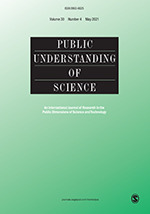 This study examines the effects of exposure to media narratives about science on perceptions pertaining to the reliability of science, including trust, beliefs, and support for science. In an experiment (n = 4497), participants were randomly assigned to read stories representing ecologically valid media narratives: the honorable quest, counterfeit quest, crisis or broken, and problem explored. Exposure to stories highlighting problems reduced trust in scientists and induced negative beliefs about scientists, with more extensive effects among those exposed to the “crisis/broken” accounts and fewer for those exposed to “counterfeit” and “problem explored” stories. In the “crisis/broken” and “problem explored” conditions, we identified a three-way interaction in which those with higher trust who considered the problem-focused stories to be representative of science were more likely to believe science is self-correcting and those with lower trust who perceived the stories to be representative were less likely to report that belief. Support for funding science was not affected by the stories. This study demonstrates the detrimental consequences of media failure to accurately communicate the scientific process, and provides evidence for ways for scientists and journalists to improve science communication, while acknowledging the need for changes in structural incentives to obtain such a goal.
This study examines the effects of exposure to media narratives about science on perceptions pertaining to the reliability of science, including trust, beliefs, and support for science. In an experiment (n = 4497), participants were randomly assigned to read stories representing ecologically valid media narratives: the honorable quest, counterfeit quest, crisis or broken, and problem explored. Exposure to stories highlighting problems reduced trust in scientists and induced negative beliefs about scientists, with more extensive effects among those exposed to the “crisis/broken” accounts and fewer for those exposed to “counterfeit” and “problem explored” stories. In the “crisis/broken” and “problem explored” conditions, we identified a three-way interaction in which those with higher trust who considered the problem-focused stories to be representative of science were more likely to believe science is self-correcting and those with lower trust who perceived the stories to be representative were less likely to report that belief. Support for funding science was not affected by the stories. This study demonstrates the detrimental consequences of media failure to accurately communicate the scientific process, and provides evidence for ways for scientists and journalists to improve science communication, while acknowledging the need for changes in structural incentives to obtain such a goal.
Authors
- Yotam Ophir
- Kathleen Hall Jamieson

